The Intel 9th Gen Review: Core i9-9900K, Core i7-9700K and Core i5-9600K Tested
by Ian Cutress on October 19, 2018 9:00 AM EST- Posted in
- CPUs
- Intel
- Coffee Lake
- 14++
- Core 9th Gen
- Core-S
- i9-9900K
- i7-9700K
- i5-9600K
CPU Performance: Rendering Tests
Rendering is often a key target for processor workloads, lending itself to a professional environment. It comes in different formats as well, from 3D rendering through rasterization, such as games, or by ray tracing, and invokes the ability of the software to manage meshes, textures, collisions, aliasing, physics (in animations), and discarding unnecessary work. Most renderers offer CPU code paths, while a few use GPUs and select environments use FPGAs or dedicated ASICs. For big studios however, CPUs are still the hardware of choice.
All of our benchmark results can also be found in our benchmark engine, Bench.
Corona 1.3: Performance Render
An advanced performance based renderer for software such as 3ds Max and Cinema 4D, the Corona benchmark renders a generated scene as a standard under its 1.3 software version. Normally the GUI implementation of the benchmark shows the scene being built, and allows the user to upload the result as a ‘time to complete’.
We got in contact with the developer who gave us a command line version of the benchmark that does a direct output of results. Rather than reporting time, we report the average number of rays per second across six runs, as the performance scaling of a result per unit time is typically visually easier to understand.
The Corona benchmark website can be found at https://corona-renderer.com/benchmark
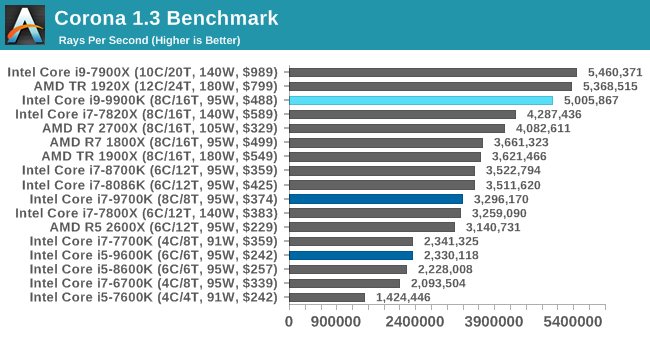
Corona is a fully multithreaded test, so the non-HT parts get a little behind here. The Core i9-9900K blasts through the AMD 8-core parts with a 25% margin, and taps on the door of the 12-core Threadripper.
Blender 2.79b: 3D Creation Suite
A high profile rendering tool, Blender is open-source allowing for massive amounts of configurability, and is used by a number of high-profile animation studios worldwide. The organization recently released a Blender benchmark package, a couple of weeks after we had narrowed our Blender test for our new suite, however their test can take over an hour. For our results, we run one of the sub-tests in that suite through the command line - a standard ‘bmw27’ scene in CPU only mode, and measure the time to complete the render.
Blender can be downloaded at https://www.blender.org/download/
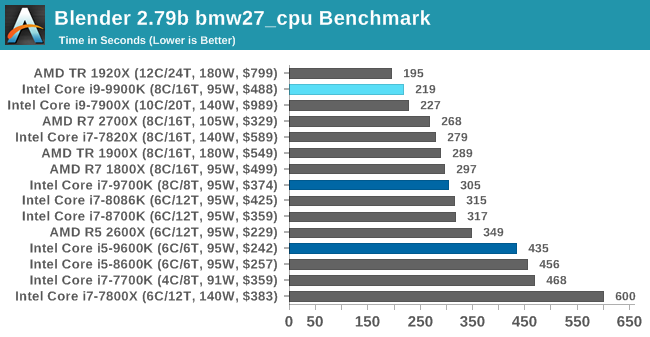
Blender has an eclectic mix of requirements, from memory bandwidth to raw performance, but like Corona the processors without HT get a bit behind here. The high frequency of the 9900K pushes it above the 10C Skylake-X part, and AMD's 2700X, but behind the 1920X.
LuxMark v3.1: LuxRender via Different Code Paths
As stated at the top, there are many different ways to process rendering data: CPU, GPU, Accelerator, and others. On top of that, there are many frameworks and APIs in which to program, depending on how the software will be used. LuxMark, a benchmark developed using the LuxRender engine, offers several different scenes and APIs.
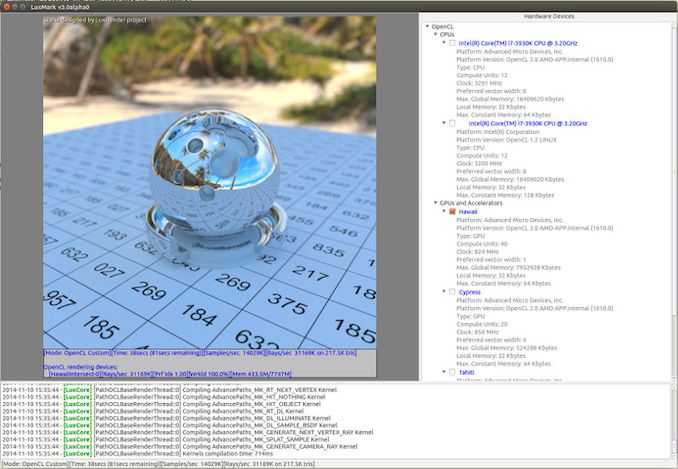
Taken from the Linux Version of LuxMark
In our test, we run the simple ‘Ball’ scene on both the C++ and OpenCL code paths, but in CPU mode. This scene starts with a rough render and slowly improves the quality over two minutes, giving a final result in what is essentially an average ‘kilorays per second’.
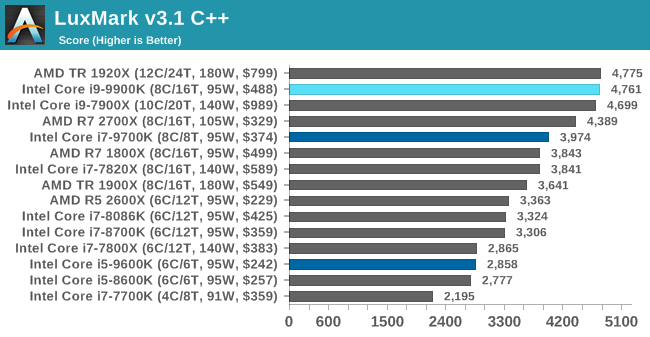
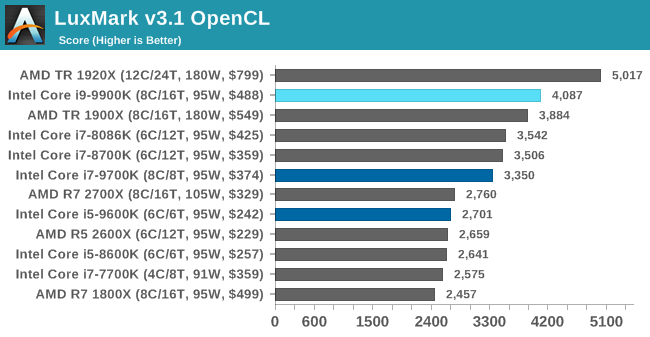
POV-Ray 3.7.1: Ray Tracing
The Persistence of Vision ray tracing engine is another well-known benchmarking tool, which was in a state of relative hibernation until AMD released its Zen processors, to which suddenly both Intel and AMD were submitting code to the main branch of the open source project. For our test, we use the built-in benchmark for all-cores, called from the command line.
POV-Ray can be downloaded from http://www.povray.org/
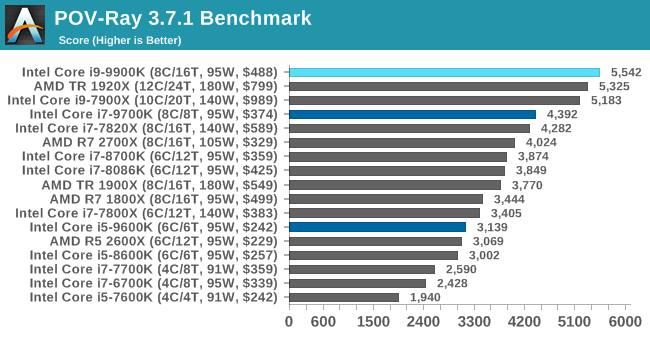


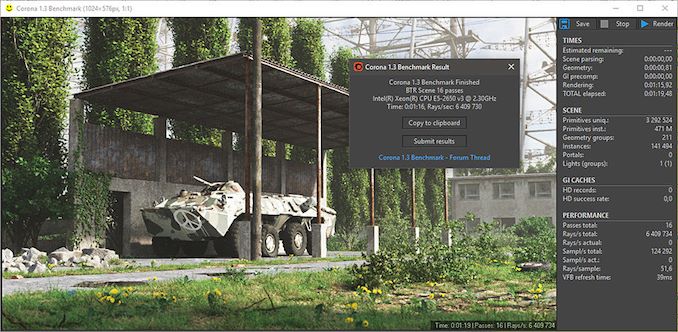








274 Comments
View All Comments
SanX - Thursday, October 25, 2018 - link
How come i7-7800x outperforms i9-9900 by the killing factor of 3-4 in particle movement? Is it not as "hand tunable" as older gen chips?davidk3501 - Thursday, October 25, 2018 - link
This is an overclockable processor, allowing users to push the frequency if the cooling is sufficient, and despite the memory controller still rated at DDR4-2666, higher speed memory should work in almost every chip. The Core i9-9900K also gets a fully-enabled cache, with 2 MB available per core for a chip-wide total of 16 MBashlord - Thursday, October 25, 2018 - link
My son's 4690K just blew up at such a shitty time. 8th gen 8400 is a decent replacement but 9th gen is out, so I don't really want to buy a previous gen item. I am guessing the '9400' will be out in a month or two. Going the AMD route has its issues too. It seems that AMD processors still have some issues with virtual appliances built using an older kernel. And in the past 30 years of computer ownership, I have never upgraded the processor. Components like motherboard or ram usually fail way before the CPU goes poof.In my country, R5 2600 w/Gigabyte Aorus B450M, 16GB of TridentZ RGB and a Cryorig M9+ goes for S$751. 8400 with MSI H310M Pro-M2, G.Skill Ripjaws V2400 and the same cooler goes for S$710.
ARgh!!! Don't know what to choose! Or maybe I should just give him my 6700K and get myself a new shiny toy.
nukunukoo - Friday, October 26, 2018 - link
I'm glad competition from AMD is back. Just a little over three years ago, an 8-core Intel would be a Xeon costing an arm and a leg!Dragonrider - Monday, October 29, 2018 - link
Just a note re the IGP. If you are going to try to watch 4k Blu-ray on your computer, you NEED that Intel IGP. I don't think there is any other solution to the DRM. For some, that alone would be a reason to get the Intel processor, all else being in the same ballpark.y2k1 - Wednesday, October 31, 2018 - link
What about performance pet watt? Is it basically the same as last gen?hanselltc - Thursday, November 1, 2018 - link
wat bout 9700k vs 9900k in gaming thoAlways_winter - Wednesday, November 28, 2018 - link
what cpu cooler did you usepoohbear - Monday, December 10, 2018 - link
Wow that 10nm CPU is taking forever eh? AMD is to release 7nm CPUs next month, and intel can't produce 10nm in 2019? What happened exactly?ROGnation7 - Saturday, February 23, 2019 - link
Watching all these benchmarks nowadays and taking count on how well optimised games are these days , at last the AAA titles , makes you think if it even worth it to spend more than 300-350 bucks on CPUs for gaming . Just look at i5-9600k and r5 2600x going toe to toe with high end CPUs with a decent graphics card.